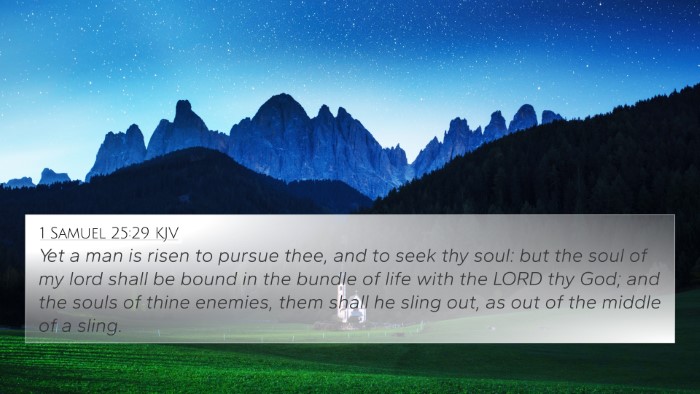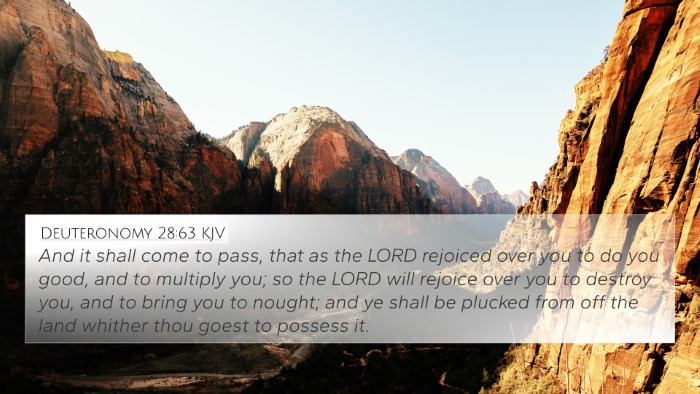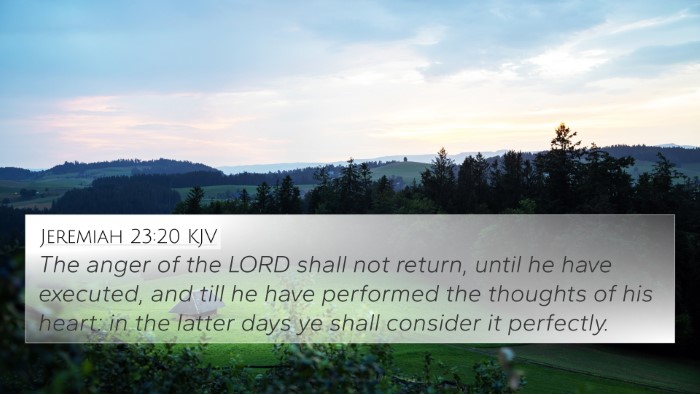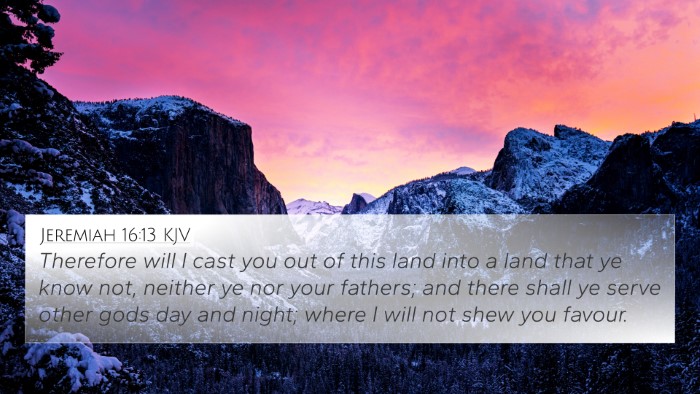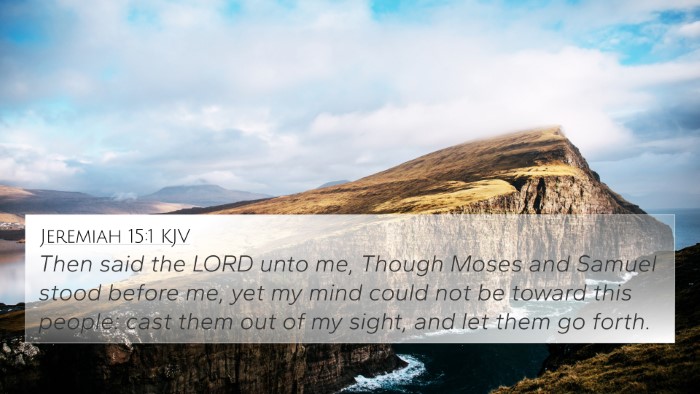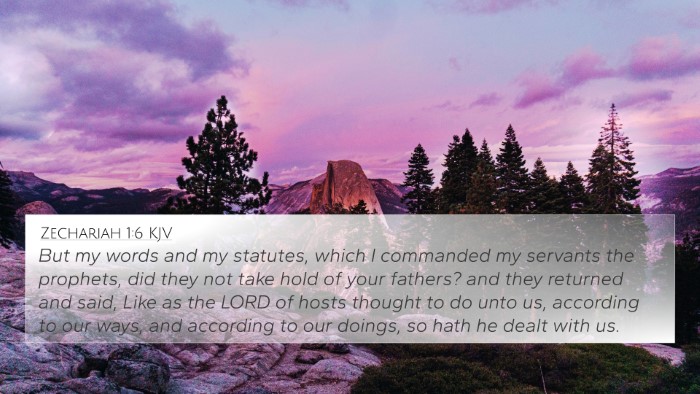Understanding Jeremiah 10:18
Jeremiah 10:18 states: "For thus saith the LORD, Behold, I will sling out the inhabitants of the land at this once, and will distress them, that they may find it so."
This verse is a poignant message from God through the prophet Jeremiah, reflecting on the fate of the people due to their persistent unfaithfulness and idolatry.
Summary of Meaning
The passage reveals God's intention to bring judgment upon His people, emphasizing the consequences of their actions. The phrase "sling out the inhabitants" suggests a forceful removal, indicative of divine discipline for their waywardness. The purpose given is not only to punish but that the people may recognize the weight of their transgressions and turn back to God. This verse carries a theme of divine sovereignty, human accountability, and the opportunity for repentance.
Insights from Public Domain Commentaries
Matthew Henry
Matthew Henry highlights the seriousness of the situation during Jeremiah's time, where the people were deeply entrenched in idolatry. He notes that God's actions are fair retributions for their disregard of His commandments. The distress mentioned serves as a wake-up call for the people to realize their sinful ways and to seek God earnestly.
Albert Barnes
Albert Barnes clarifies that this punishment is not arbitrary but rather a consequence of the people's sinful behavior. He commentates on the idea that such distress is meant to lead to self-examination and acknowledgment of their rebellion against God. Barnes elaborates on the notion that God's plan encompasses justice with the hope of eventual repentance.
Adam Clarke
Adam Clarke provides an exposition on the figurative language employed in the verse, suggesting that the image of slinging out implies a dramatic removal from the land, a metaphor for exile. He emphasizes the dichotomy of judgment and mercy, asserting that despite the impending doom, there exists an underlying message of hope if they turn back to God.
Related Bible Cross-References
- Jeremiah 24:10 - "And I will send the sword, the famine, and the pestilence among them, till they be consumed from off the land that I gave unto them and to their fathers."
- Lamentations 3:34-36 - "To crush under his feet all the prisoners of the earth, to turn aside the right of a man before the face of the most High, to subvert a man in his cause, the Lord approveth not."
- Ezekiel 12:15 - "And they shall know that I am the LORD when I shall scatter them among the nations and disperse them in the countries."
- Hosea 5:15 - "I will go and return to my place, till they acknowledge their offense and seek my face; in their affliction they will seek me earnestly."
- Isaiah 10:5 - "O Assyrian, the rod of mine anger, and the staff in their hand is mine indignation!"
- Deuteronomy 28:64 - "And the LORD shall scatter thee among all people, from the one end of the earth even unto the other; and there thou shalt serve other gods, which neither thou nor thy fathers have known, even wood and stone."
- Psalms 107:39 - "Again, they are diminished and brought low through oppression, affliction, and sorrow."
- Micah 6:9 - "The Lord's voice crieth unto the city, and the man of wisdom shall see thy name: hear ye the rod, and who hath appointed it."
- Zephaniah 1:4-6 - "I will also stretch out mine hand upon Judah, and upon all the inhabitants of Jerusalem; and I will cut off the remnant of Baal from this place, and the name of the Chemarims with the priests."
- Revelation 3:19 - "As many as I love, I rebuke and chasten: be zealous therefore, and repent."
Thematic Connections and Interpretations
The verse resonates within the broader context of divine warnings throughout Scripture. Through careful cross-referencing, one can identify significant themes such as judgment, repentance, and restoration found in both the Old and New Testaments. The inter-Biblical dialogue showcases how God consistently calls His people to recognize their sins and return to Him.
Exploring Connections between Bible Verses
-
The Judgment Theme: The consistent message about God's righteous judgment appears throughout the prophetic books, reinforcing the importance of accountability (see Jeremiah 25:29).
-
Call to Repentance: Verses like 2 Chronicles 7:14 echo the need for genuine repentance to restore the relationship with God.
-
Restoration Promises: Passages such as Joel 2:25-27 highlight God's desire to restore those who have strayed, aligning with the hope embedded within Jeremiah's prophecy.
Using Cross-References in Bible Study
Understanding how to use Bible cross-references can significantly enhance one's study and interpretation of Scripture. These connections offer insights into the relationships between verses and themes across the Bible, allowing for a more in-depth understanding of God's message. Here are some tools and methods on how to effectively employ cross-referencing:
- Bible Concordance: Utilizing a concordance can help you find where specific themes or words appear throughout Scripture.
- Cross-Reference Bible Study Guides: Many study Bibles provide cross-references that can lead you to relevant or contrasting texts.
- Bible Chain References: Create or follow chains of verses that are linked by similar themes or stories to observe how different parts of the Bible inform each other.
Conclusion
Jeremiah 10:18 encapsulates a critical moment for Israel—a call to recognize the gravity of their sins and the ensuing judgment from God. Through studying this verse alongside its cross-references, believers can gain clarity on the themes of judgment, accountability, and hope for restoration that echo throughout Scripture. By embracing effective cross-referencing techniques, one can deepen their understanding of biblical truths and cultivate a richer spiritual life.



